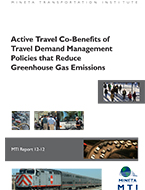- 408-924-7560
- mineta-institute@sjsu.edu
- Donate
Active Travel Co-Benefits of Travel Demand Management Policies that Reduce Greenhouse Gas Emissions
There is increasing evidence that improved health outcomes may be significant co-benefits of land use plans and transport policies that increase active transport (or walking and biking for purposeful travel) and reduce greenhouse gas emissions (GHGs) from vehicle miles traveled (VMT). A greater understanding of these benefits may broaden the constituency for regional planning that supports local and national GHG reduction goals. In this study, California’s activity-based travel demand model (ABM) is applied to (1) demonstrate how this new generation of travel models can be used to produce the active travel data (age and sex distributions) required by comparative risk assessment models to estimate health outcomes for alternative land use and transport plans and to (2) identify the magnitude of change in active travel that may be possible from land use, transit, and vehicle pricing policies for California and its five major regions for a future 2035 time horizon. The results of this study suggest that distance-based vehicle pricing may increase walking by about 10% and biking by about 17%, and concurrently GHG from VMT may be reduced by about 16%. Transit expansion and supportive development patterns may increase active travel by about 2% to 3% for both walk and bike modes while also reducing VMT by about 4% on average. The combination of all three policies may increase time spent walking by about 13% and biking by about 19%, and reduce VMT by about 19%.
CAROLINE RODIER, PhD
Dr. Caroline Rodier is a Research Associate at the Mineta Transportation Institute and the Associate Director of the Urban Land Use and Transportation Center at the University of California, Davis. Her major areas of research include transportation and environmental planning and policy analysis. Caroline has extensive experience applying land use and transportation models to explore both their promise and limits to inform public investment, planning, and policy decisions. At the University of California, Davis, she managed the development of activity-based microsimulation models for the State of California and the San Joaquin Valley. She currently applies these models to investigate demand management policy synergisms, performance measurement, and policy effects on inter-regional and commercial vehicle travel. Previously, as a Senior Research at the Transportation Sustainability Research Center at the University of California, Berkeley, she led research evaluations of parking information and pricing technologies as well as shared-use modes to facilitate first and last mile access to transit. She currently serves at the Chair of the Transportation Research Board’s Emerging and Innovative Public Transport and Technologies Committee. Caroline holds a PhD in Ecology and an M.S. in Community Development from the University of California, Davis, and a B.A. in U.S. History from Barnard College, Columbia University.
RICHARD W. LEE, PhD, AICP
Richard Lee is a lecturer in the Urban and Regional Planning Department at San José State University and has been a research associate with the Mineta Transportation Institute (MTI) for over 15 years. He has led MTI studies of general plans and sustainability, airport planning, and sustainability indicators for transportation. Dr. Lee is also an associate with Fehr & Peers, and he has over 25 years of experience as a transportation consultant and academic. His consulting experience includes management of regional transportation plans, general plan studies, high-speed rail and transit projects, as well as a wide variety of traffic impact, travel demand management, and transportation policy studies. The majority of his recent work focuses on quantitative analysis of the transportation effects of New Urbanism, including its efficacy in promoting transit and alternative modes. Dr. Lee earned his master’s degrees in Civil Engineering (1984) and City and Regional Planning (1985) and his PhD in City and Regional Planning (1995), all from the University of California at Berkeley. In 2009–2010 he was the Visiting Practitioner and Researcher at UC Davis’s Sustainable Transportation Center. He has taught transportation planning and conducted transportation research projects at several universities, including Massey University in New Zealand, UCLA, Cal Poly San Luis Obispo, UC Berkeley, and San José State University.
BRANDON HAYDU
Brandon Haydu currently works as a Transportation Planner for Fehr and Peers and works on a variety of travel demand modeling projects. Prior to joining Fehr and Peers, Brandon was a transportation modeler for the Urban Land Use and Transportation Center (ULTRANS) at the University of California, Davis (UC Davis). While at UC Davis, he worked on the construction of the California Statewide Travel Demand Model and the San Joaquin Valley Interregional Model. Before working at ULTRANS, Brandon interned for both W‐Trans and the City of Davis. He attended California Polytechnic State University, San Luis Obispo, for his Master of City and Regional Planning and Master of Science in Engineering, both specializing in transportation planning. He attended the UC Davis for his Bachelor of Arts in Political Science.
NICHOLAS J. LINESCH
Nicholas J. Linesch is a researcher at Institute of Transportation Studies, Davis. His research focuses on the interaction of transportation and land use. He has been involved with model development projects on citywide and statewide scales. He has contributed to activity-based modeling teams at the City of San Francisco and at the Urban Land Use and Transportation Center. He is currently contracted to the California Department of Public Health where he is looking at policy analysis around the interaction of public health and travel. Nicholas has his Master’s in Civil and Environmental Engineering from UC Davis and he is currently living in Oakland, California.
-
Contact Us
San José State University One Washington Square, San Jose, CA 95192 Phone: 408-924-7560 Email: mineta-institute@sjsu.edu






